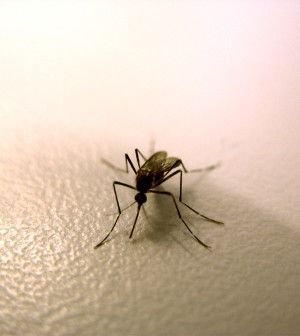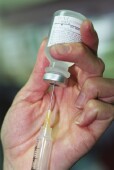- 8 Ways to Increase Dopamine Naturally
- 7 Best Breads for Maintaining Stable Blood Sugar
- Gelatin vs. Collagen: Which is Best for Skin, Nails, and Joints?
- The Long-Term Effects of Daily Turmeric Supplements on Liver Health
- Could Your Grocery Store Meat Be Causing Recurring UTIs?
- Are You Making This Expensive Thermostat Error This Winter?
- Recognizing the Signs of Hypothyroidism
- 10 Strategies to Overcome Insomnia
- Could Artificial Sweeteners Be Aging the Brain Faster?
- Techniques for Soothing Your Nervous System
HPV Vaccines May Be Less Effective for Black Women: Study


MONDAY, Oct. 28Black women may get less protection than whites from the vaccines recommended for preventing human papillomavirus (HPV), which causes cervical cancer, a new study suggests.
The currently available vaccines, Gardasil and Cervarix, don’t target the types of HPV infection found most often in black women, the study authors said.
Experts have long believed that most cervical cancers are caused by persistent infection with subtypes of the sexually transmitted virus known as HPV 16 and HPV 18. These are the strains targeted by Gardasil and Cervarix. (Gardasil also targets HPV 6 and HPV 11.)
But black women tend to develop cancer of the cervix — the lower part of the uterus or womb — and die from it more often than white women, even when screening programs are similar, according to background information included in the study. This led the researchers to wonder if blacks might be less likely to benefit from vaccination.
“HPV 16 and 18 occur less frequently in African-Americans than in whites,” said study researcher Cathrine Hoyo, associate professor of obstetrics and gynecology at the Duke University School of Medicine.
Hoyo’s team looked at women who had abnormal results on Pap tests — screenings to detect precancerous cervical abnormalities.
Of the nearly 600 women with Pap smear abnormalities in the study, about 86 percent had detectable HPV, Hoyo said.
“African-Americans had half the HPV 16 and 18 frequency as whites did,” said Hoyo, who is scheduled to present the findings Monday at a conference of the American Association for Cancer Research in National Harbor, Md.
The findings, if replicated in larger studies, could call into question the effectiveness of the current vaccines for all races, she said.
But women should still get an HPV vaccine, said Dr. Robert Morgan, co-director of the gynecological oncology program at the City of Hope Comprehensive Cancer Center in Duarte, Calif. “I don’t think recommendations on vaccination would change [based] on this data,” said Morgan, who was not involved in the research.
The American Cancer Society estimates that more than 12,000 new cases of cervical cancer will be diagnosed this year, and more than 4,000 women will die of the disease. Blacks are about 20 percent more likely to get cervical cancer, Hoyo said, and about twice as likely to die from it as white women.
The U.S. Centers for Disease Control and Prevention recommends HPV vaccination for preteen boys and girls at age 11 or 12, before sexual activity begins. The vaccines, given in three injections over a six-month period, cost about $400 or more total.
In developing Gardasil and Cervarix, scientists relied on studies to pinpoint the strains of HPV most likely to lead to cancer. Studies were done on all ethnicities, Hoyo said, noting that there may have been insufficient numbers of black women in the research studies to pick up the differences in HPV subtypes.
“There has always been some skepticism about whether there are other strains that are important, other than 16 and 18,” she said. This study is not the first to report the differences, she said.
The findings, however, are not a reason for blacks not to get an HPV vaccine, Hoyo said. Testing of vaccines that target additional HPV subtypes are under way, and in time the problem may be solved, she added.
Research presented at medical meetings should be viewed as preliminary until published in a peer-reviewed journal.
More information
To learn more about cervical cancer, visit the American Cancer Society.
Source: HealthDay
Copyright © 2026 HealthDay. All rights reserved.










